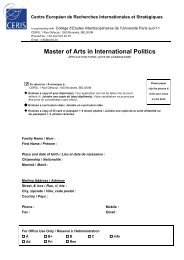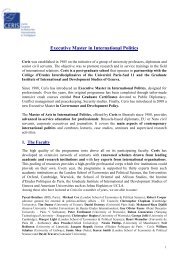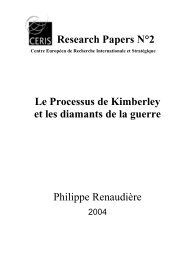hydropolitics of the tigris - euphrates river basin with - ceris.be
hydropolitics of the tigris - euphrates river basin with - ceris.be
hydropolitics of the tigris - euphrates river basin with - ceris.be
Create successful ePaper yourself
Turn your PDF publications into a flip-book with our unique Google optimized e-Paper software.
Hydropolitical Conflict Resolution: Attempts to Achieve Regional Hydrological Harmony and<br />
Security<br />
Up to <strong>the</strong> present <strong>the</strong> three countries along <strong>the</strong> Tigris-Euphrates complex have classified <strong>the</strong>mselves (and<br />
<strong>be</strong>en viewed outside) as simply upstream users and downstream users. Negotiations during <strong>the</strong> first half <strong>of</strong><br />
<strong>the</strong> Twentieth Century were more <strong>of</strong>ten <strong>the</strong> result <strong>of</strong> European influence from outside <strong>of</strong> <strong>the</strong> region and were<br />
relatively smooth. 56 One <strong>of</strong> <strong>the</strong> first treaties signed from <strong>with</strong>in <strong>the</strong> region was <strong>the</strong> Treaty <strong>of</strong> Friendship and<br />
Good Neighbourliness (signed in 1946). This <strong>of</strong>fered one <strong>of</strong> <strong>the</strong> first legal instruments for co-operation for<br />
<strong>the</strong> present-day entities <strong>of</strong> <strong>the</strong> signatories. 57<br />
The fact that Syria exists as a sometime ‘middle-stream’ entity <strong>with</strong> regards to Iraq only serves to add to <strong>the</strong><br />
complexity <strong>of</strong> an already complicated issue. The most likely disputes can <strong>be</strong> characterised as; Syria and<br />
Turkey, Syria and Iraq, both Syria and Iraq against Turkey and possibly, in <strong>the</strong> future as GAP progresses<br />
into <strong>the</strong> Tigris, <strong>be</strong>tween Iraq and Turkey. The water policies <strong>of</strong> each country (and conflicting claims for<br />
access to water), almost all <strong>of</strong> <strong>the</strong>m unilateral, can <strong>be</strong> summed up as:<br />
“…pitting <strong>the</strong> prerogatives <strong>of</strong> an upstream country against those <strong>of</strong> a midstream and a downstream country;<br />
<strong>the</strong> territorial sovereignty <strong>of</strong> one country against <strong>the</strong> historical rights <strong>of</strong> ano<strong>the</strong>r; <strong>the</strong> aspiration <strong>of</strong> ethnic<br />
minorities against centralised authoritarian states; <strong>the</strong> need for economic development against <strong>the</strong><br />
requirement to protect <strong>the</strong> environment; short-term sectoral interests against those <strong>of</strong> <strong>the</strong> regional community<br />
<strong>of</strong> nations.” 58<br />
The Joint Technical Committee (JTC) and Regional Tripartite Meetings<br />
The JTC had its origins in <strong>the</strong> Turkish-Iraqi Treaty <strong>of</strong> 1946 (first regional agreement) but its first meeting<br />
was in 1965. Discussions focussed on <strong>the</strong> Euphrates <strong>with</strong> Turkey’s Keban, Syria’s Tabqua and Iraq’s<br />
Haditha Dam. Disputes arose immediately over consumption figures and irrigation needs. During <strong>the</strong> early<br />
1980’s much <strong>of</strong> <strong>the</strong> discussions centred on <strong>the</strong> GAP project (again <strong>with</strong> no resolution) and, after 16 meetings<br />
<strong>the</strong> JTC held its last session in 1993. Interestingly enough <strong>the</strong> subject <strong>of</strong> <strong>the</strong> meeting was to try to agree upon<br />
<strong>the</strong> joint management <strong>of</strong> <strong>the</strong> Euphrates but a disagreement on terminology and definitions ultimately blocked<br />
any progress. Syria and Iraq presented a model <strong>of</strong> co-riparians equally sharing an international <strong>river</strong> while<br />
Turkey maintained <strong>the</strong> Euphrates was not international but transboundary, and not subject to this form <strong>of</strong><br />
24





